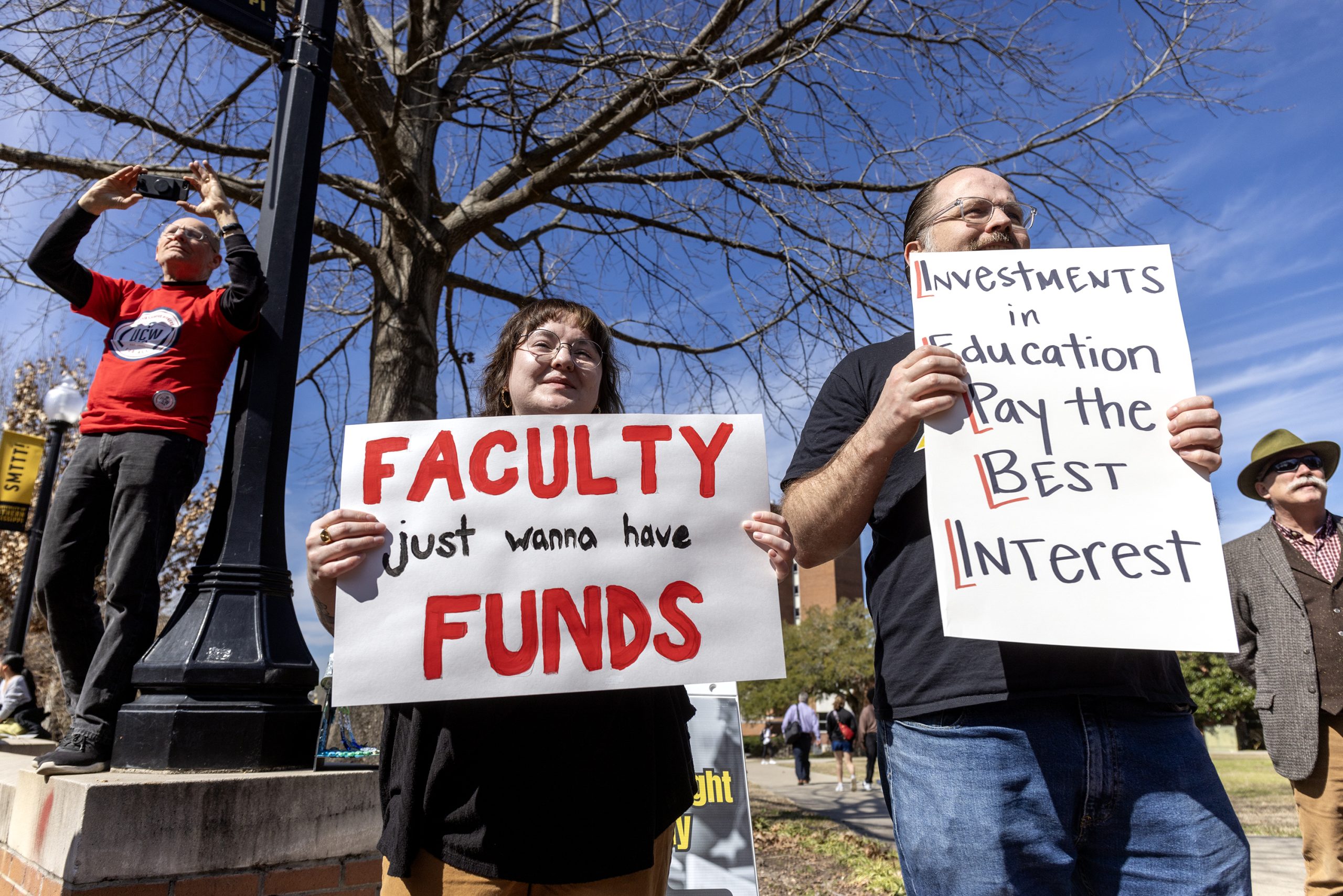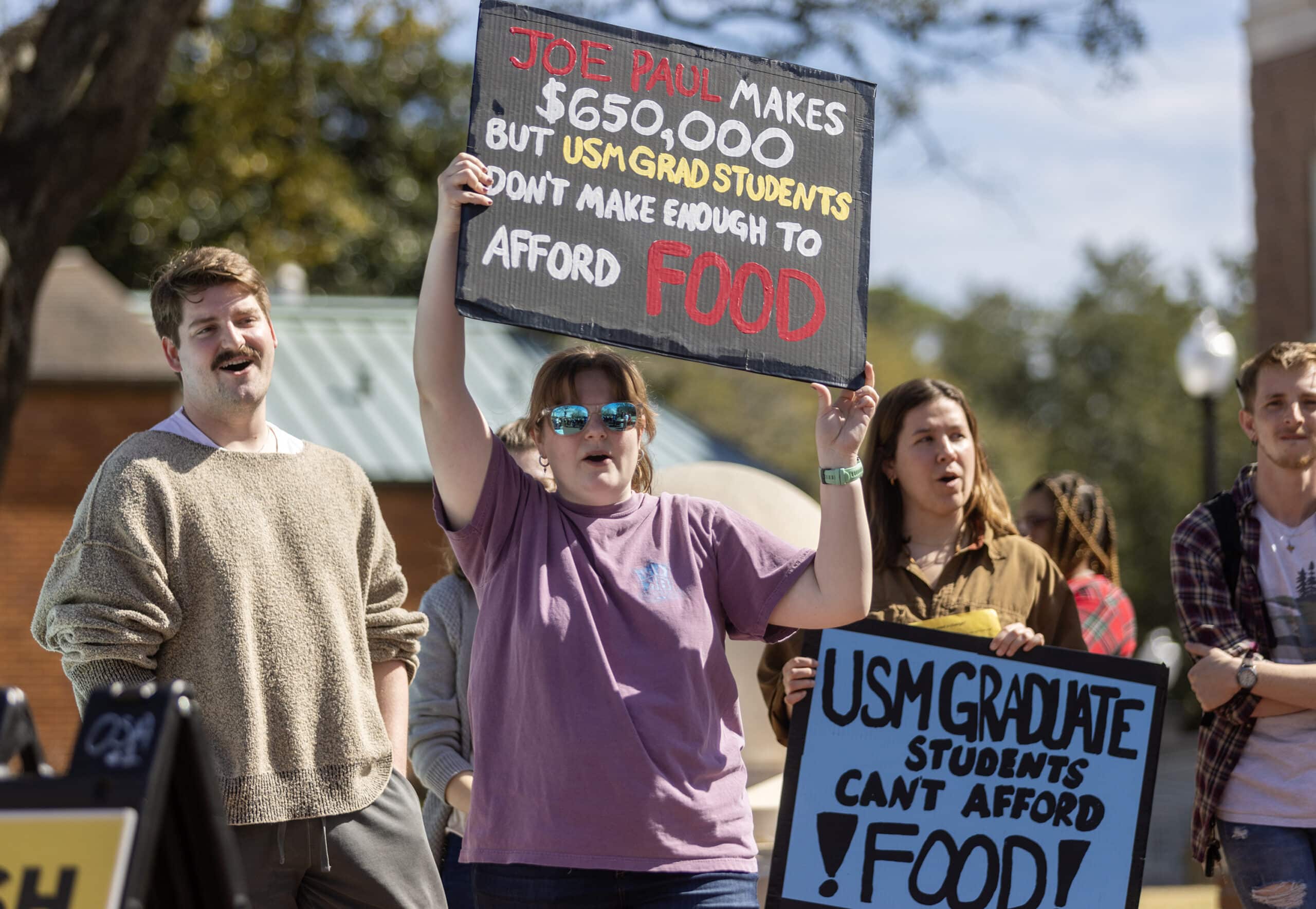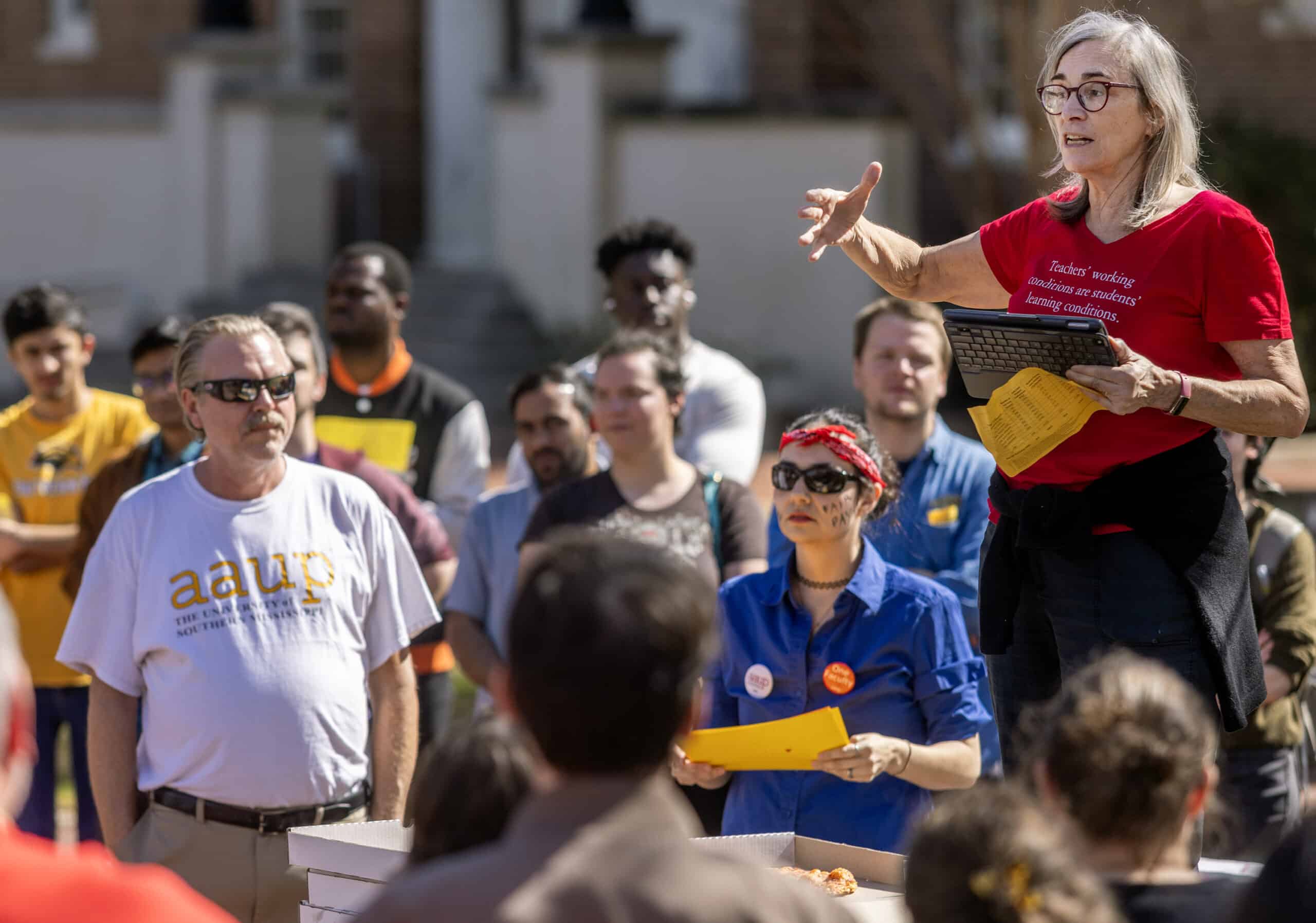Mississippi Today
Mississippi’s university faculty are woefully underpaid. Is that ‘economic reality’?

Higher education officials — from the presidents of each public university to the commissioner of their central governing board — all agree: Mississippi's faculty and staff are woefully underpaid.
“If there's ever a group in the United State of America that deserves our applause, deserves our thanks and appreciation,” it is the faculty, University of Mississippi Chancellor Glenn Boyce said during an impassioned speech at the Institutions of Higher Learning Board of Trustees meeting Thursday.
“The essence of our education is the faculty,” said Tom Duff, the billionaire owner of Southern Tire Mart who chairs IHL's finance committee. “So they need to be fairly compensated.”
Pay raises have “been an ongoing priority for the board,” Commissioner Alfred Rankins told Mississippi Today.
But despite several years of state-funded pay raises, Mississippi's faculty and staff continue to make far less than those in other Southern states. An analysis of federal data shows just three institutions — University of Mississippi, Mississippi State University and University of Southern Mississippi — pay their faculty above the average salary in neighboring states of $73,163.
Faculty also make far less than they used to. Since 2016, the average faculty member in Mississippi has actually seen a nearly $11,000 pay cut due to inflation, according to an analysis of federal data. In fall 2022, the average faculty salary in Mississippi was $68,676.
Why is that?
Some reasons that IHL has offered at the Capitol and during its board meeting include: General inflationary pressures on the universities, a rise in health insurance premiums and financial problems plaguing retirement for public employees.
Though it has long been IHL's goal to bring faculty salaries up to the Southern Regional Education Board average, that has been somewhat out of reach as Rankins told the Senate Appropriations Committee on Wednesday that other states are raising pay faster than Mississippi. And, coupled with a falling number of high school graduates that means less tuition, Rankins said the universities are staring down a functional budget cut this year if lawmakers provide IHL with level funding.
Still, the agency does not want to ask for more money than lawmakers will appropriate, and it would be “a large number” to raise faculty salaries to the SREB average in one year, Rankins told the committee.
IHL is asking lawmakers to appropriate $53 million for salaries, enough for a 6.4% incremental raise for faculty, according to IHL's 2025 legislative funding priorities.
“Our board structures their request based on revenue collection and what we reasonably think the Legislature will appropriate to our universities given their other priorities,” Rankins said.
To many faculty at the University of Southern Mississippi, where more than 100 people attended a rally for fair pay Thursday, those other priorities may be the cause of the wage stagnation. A flier distributed at the rally said USM pays faculty $10,000 less than peer institutions.
In one example, Ole Miss has its eyes this year on a $165 million residence hall, and a $49 million parking garage. Jackson State University and Mississippi Valley State University are also requesting funding for residence halls.
“The bottom line is that public higher education in Mississippi and everywhere needs robust and sustainable public funding that prioritizes the core academic mission,” Irene Mulvey, the president of the American Association of University Professors, said at the USM rally to cheers of “hear, hear.”
“That means compensation for the faculty,” she added. “The people, without whom, you would not have a university.”
At the IHL meeting, Rankins, Boyce and Duff all said that investing in dormitories and athletic facilities supports pay raises for faculty, not just because the universities rely on tuition.
“There's no contradiction because you're talking about a separate pool of money,” Rankins said. “Salaries come from the general E-and-G appropriations. Capital funds are typically bonded. It's different funding.”
Boyce said Ole Miss, where the enrollment cliff is not an issue, needs to fund updated facilities to accommodate its growing enrollment because tuition now makes up about 75% of the university budget.
It's IHL's purview, Boyce added, to come up with a legislative request for faculty raises. Unlike with capital projects, Ole Miss does not enter the session with a specific dollar amount for faculty raises that it will ask lawmakers to fund. The university sets the actual percentage raise that faculty receive after the session.
“We use almost every penny of what they give us for faculty and staff raises, and that's why it's so important to us to gain their support,” Boyce said of lawmakers. “That's not to say we wouldn't obviously reach into tuition dollars. It all flows together and works together. It is not a case of one versus another. It's a case of what the demand is.”

In an emailed statement after the IHL meeting, Boyce said Ole Miss has raised nominal employee salaries 11% over the past three years and hopes to provide another raise this summer to “attrain and retain high-quality employees.”
“We have been fortunate to experience several years of growth as an institution, in part because we are focused on continuing to improve the student experience and quality of life for our employees,” he said. “We also have to grow enrollment to ensure academic quality and offer new programs, which requires us to build facilities to house and educate more students.”
Duff said IHL's request is made in collaboration with the university presidents like Boyce. In years past, IHL has told the university presidents they need to give faculty a larger raise, though Duff didn't specify which year that happened.
“It is our constant endeavor to make sure they're paid appropriately,” Duff said of faculty. “To think that we don't see those salaries is incorrect.”
Though Duff said that he can't say the money the state of Mississippi is spending on athletic buildings could not be better spent on faculty salaries, it is a fact that students want better facilities.
“It's a great question,” Duff said. “But fortunately or unfortunately, schools cater to the demands of the students and to the demands of the economic reality we're in.”
This article first appeared on Mississippi Today and is republished here under a Creative Commons license.
Mississippi Today
On this day in 1950


MAY 16, 1950

Twenty Black families from South Carolina filed the lawsuit, Briggs v. Elliott, the first direct attack on the validity of the “separate but equal” doctrine in public schools.
The litigation was later combined with the successful Brown v. Board of Education case. The litigation might never have happened if not for the Rev. Joseph A. DeLaine, who accepted the NAACP's call to challenge the school bus transportation practices in Clarendon County, where Black students had to walk up to 8 miles to school.
“I realize that the stand that I take may cost me my job as a school teacher, but we need men,” he wrote.
Property owner Levi Pearson had previously sued, asking that school buses be provided for Black students. After his lawsuit failed on technical grounds, Thurgood Marshall approached DeLaine, saying he needed families for litigation, or the NAACP couldn't go any further.
After gathering the signatures of 107 parents and their children, economic pressure and violence followed. Despite this, 17 adults signed the petition again, and the lawsuit moved forward to trial. Evidence showed that South Carolina spent $221 annually for each white student, but only $45 for each Black student. White children had modern schools with a teacher for every grade. Meanwhile, Black children studied in wooden shacks, reading textbooks discarded by white students.
As a result of their activism, the Pearson family saw boycotts of their timber, and the Briggses were fired from their jobs. So were DeLaine and his wife. They saw their home and church burned to the ground. They were forced to leave the state after a drive-by shooting. In 2003, the families of DeLaine, Levi Pearson and the Briggses received Congressional Gold Medals for their courage.
This article first appeared on Mississippi Today and is republished here under a Creative Commons license.
Did you miss our previous article…
https://www.biloxinewsevents.com/?p=358956
Mississippi Today
PSC axes solar programs in light of EPA funds, advocates file lawsuit
Advocates from some of the state's conservation groups — such as Audubon Delta, Mississippi Sierra Club and Steps Coalition — spoke out Wednesday against a recent decision by the Mississippi Public Service Commission to suspend several solar programs, including “Solar for Schools,” less than two years after the previous commission put them in place.
“This is particularly disappointing because the need for these incentives in the state of Mississippi is significant,” said Jonathan Green, executive director of Steps Coalition. “Energy costs in the South, and in particular the region known as the Black Belt, are higher than those in other parts of the country for a number of reasons. These regions tend to have older energy generation infrastructure, and housing that has not been weatherproofed to modern standards. For many low- to moderate-income residents in the state of Mississippi, energy burden and energy insecurity represent real daily economic challenges.”
The PSC voted 2-1 at its April docket meeting to do away with the programs, reasoning in part that new funds through the Inflation Reduction Act would be available to the state. About 10 days later, the Environmental Protection Agency awarded $62 million to the state, through the Hope Enterprise Corporation, to help low-income Mississippians afford adding solar power to their homes. The funds are part of the Biden Administration's Solar for All program, one of the several recent federal initiatives aimed at reducing greenhouse gas emissions.
The PSC decision ended three programs the previous commission put in place to encourage wider adoption of solar power through the two power companies it regulates, Entergy Mississippi and Mississippi Power: “Solar for Schools,” which allowed school districts to essentially build solar panels for free in exchange for tax credits, as well as incentives for low-income customers and battery storage.
Last Friday, the Sierra Club filed lawsuits in chancery courts in Hinds and Harrison counties against the commission, arguing the PSC broke state law by not providing sufficient reasoning or public notice before making the changes. Advocates also argued that new funding going to Hope Enterprise won't go as far without the PSC's low-income incentives.
The programs were part of a 2022 addition to the state's net metering rule, a system that allows homeowners to generate their own solar power and earn credits for excess energy on their electric bills. Mississippi's version is less beneficial to participants than net metering in most states, though, because it doesn't reimburse users at the full retail cost. Mississippi's net metering program itself is still in tact.
Northern District Commissioner Chris Brown said that, while he supported efforts to expand solar power, he didn't think programs that offer incentives from energy companies were fair to other ratepayers.

“It's the subsidy that we take issue with,” Brown said at the meeting. “It's not the solar, it's not the helping the schools. We just don't think it's good policy to spread that to the rest of the ratepayers.”
Brown and Southern District Commissioner Wayne Carr voted to end the programs, while Central District Commissioner De'Keither Stamps voted against the motion. All three are in their first terms on the PSC. Brown's position is in line with what the power companies as well as Gov. Tate Reeves have argued, which is that programs like net metering forces non-participants to subsidize those who participate.
Robert Wiygul, an attorney for the Mississippi Sierra Club, countered that argument during Wednesday's press conference, saying that net metering actually helps non-participants by adding more power to the grid and reducing the strain on the power companies' other infrastructure. Moreover, he said, the PSC hasn't offered actual numbers showing that non-participants are subsidizing the program.
“Look, if the commission wants to talk about that, we are ready to talk about it,” Wiygul said. “But what we got here is a situation where these two commissioners just decided they were going to do this. We don't even know what that claim is really based on because it hasn't been through the public notice and hasn't been through the public comment process.”
While no schools had officially enrolled in “Solar for Schools,” which went into effect in January of last year, Stamps told Mississippi Today that there were places in his district getting ready to participate in the very programs the PSC voted to suspend.

“My issue was we should have talked to the entities that were going through the process to (understand what they were doing) to participate in the programs before you eliminate the programs,” he said.
Several school districts in the state are already using solar panels thanks to funding from a past settlement with Mississippi Power. Officials there told Mississippi Today that the extra power generated from the panels has freed up spending for other educational needs. During the public comment period for the 2022 net metering update, about a dozen school district superintendents from around the state wrote in to support the initiative. Ninety-five school districts in the state would have been eligible for the program because they receive power from Entergy Mississippi or Mississippi Power.
Former commissioner Brent Bailey, who lost a close reelection bid in November to Stamps, was an advocate for the schools program that the PSC created while he was there. At the April docket meeting, he pleaded with the new commission to reconsider, arguing that the new federal funding won't have the same impact without those programs.
“My ask is to at least give this program a chance, see where it goes, and hear from stakeholders that have participated,” Bailey said. The solar programs, he added, weren't just about expanding renewable energy, but taking advantage of a growing economy around solar power as well: “We can just stand by and watch it go by, or we can participate in this and bring economic development to the state.”
This article first appeared on Mississippi Today and is republished here under a Creative Commons license.
Crooked Letter Sports Podcast
Podcast: In or out (of the NCAA Tournament)?

College baseball's regular season is in its last week, which means baseball bracketology is a popular activity. State needs to finish strong to become a Regional host. Southern Miss probably has already punched its ticket as a 2- or 3-seed. Ole Miss, playing its best baseball presently, needs victories, period. Meanwhile, the State High School softball tournament is this week in Hattiesburg, and the state baseball tournament comes to Trustmark Park in Pearl next week.
Stream all episodes here.
This article first appeared on Mississippi Today and is republished here under a Creative Commons license.
Did you miss our previous article…
https://www.biloxinewsevents.com/?p=358148
-
SuperTalk FM3 days ago
Martin Lawrence making 3 stops in Mississippi on comedy tour
-
Our Mississippi Home2 days ago
Beat the Heat with Mississippi’s Best Waterparks
-
Mississippi Today6 days ago
Lawmakers may have to return to Capitol May 14 to override Gov. Tate Reeves’ potential vetoes
-
Mississippi News7 days ago
Man arrested for allegedly breaking into home, robbing owner
-
SuperTalk FM7 days ago
Couple arrested after husband received unemployment benefits while in prison
-
Mississippi News Video5 days ago
Local dentists offer free dental care in Amory
-
Our Mississippi Home3 days ago
Charlie’s U-Pik: Opening Soon for the Summer Season
-
Mississippi News6 days ago
Bond set for West Point couple accused of killing their child







































